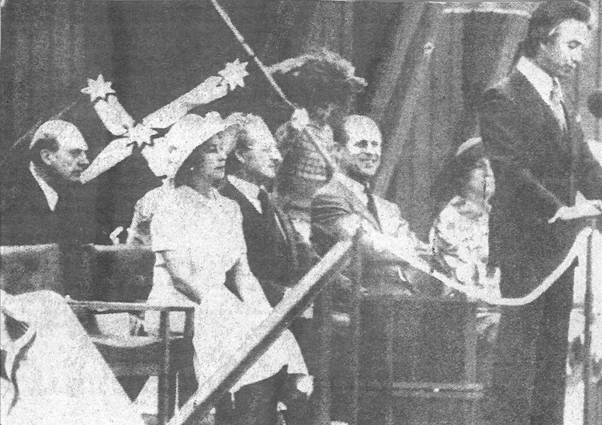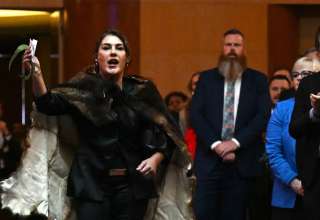by Humphrey McQueen (2000)
This is the first of a two-part series
The Australian Republican Movement recently wrote to King Charles III what only can be described as a begging letter inviting him to: ”Join Australia In Celebration Of A Republic And Australia’s Moves Towards Full Independence.” It is hardly likely that this class enemy will entertain the requests the ARM makes of him for First Nations suffering at the hands of British Imperialism or willingly promote the cause of an Australian republic and independence. Spirit of Eureka republishes Humphrey McQueen’s article from 25 years ago, “A socialist’s republic”, with an addendum explaining how the Queen gave Charles access to the Crown Jewels and tax-free estates, as a counter to ARM’s flawed approach to a republic.
See ARM’s letter to King Charles
The case for a republic anywhere is tied to social equality by challenging the monarchical doctrine that some people are born to rule over others. Because of Australia’s experience of colonisation, a republic is also part of our struggle for national independence, which aims at equality in the relations between peoples. Australia’s becoming a republic will clear a path in that direction. A republic, by jettisoning the hereditary principle behind the throne, will take a step towards social equality inside Australia. These aspects of the republic as expressions of social equality will be considered in turn.
A. The equality of nations
Federation in 1901 renovated the channels by which Australia served in the British Empire. Economic and military ties continued to bind, despite some victories over London. The A.I.F. stands for Australian Imperial Force. Canberra did not ratify even the formal independence of Dominion Status until 1942, just in time for the US imperium to more than fill the spaces left by the collapse in British power. Useful though a republic’s completion of our constitutional independence will be, the inequalities between Australia and the various imperial centers will remain rooted in economic and security questions.
One advantage from breaking the formal ties with the British Crown will be to clarify these lines of power between Australia and the rest of the world. John Kerr’s position as the Queen’s man confused analysis of his 1975 sacking of the Whitlam government. The significance of Kerr’s life-long involvement with the US-dominated intelligence community was thus harder to specify. Some Laborites even supposed that he had acted to protect the Queen’s investments. Severing the open links between the Australian state and its British counterpart will help us to resist the covert flows of influence around Australian S I Service, Britain’s MI-6 and the CIA-National Security Agency.
The change to a republic will also allow more attention to the economic levers, whether from Frankfurt, Oosaka or Los Angeles. In short, a republic will be worth while if it does no more than get rid of a source of confusion about the power of non-British imperialisms in Australia. Keating’s anti-British republicanism was a fig-leaf for his surrender to speculators from around the planet. Compelled to pick between a republic and re-regulation of our finance sector, I would pump for the latter. My point is that they are not divisible. The mentality that wants a British monarch at the top of Australia’s constitutional system is the mind-set that nourishes Howard’s playing sheriff’s deputy to those whom his idol, R. G. Menzies, called his ‘Great and Powerful Friends’. Severing the link with the British monarchy will fray the belief that we must subordinate our security to the needs of the Pentagon, or accept the trading regimes that advantage corporations.
The achievement of an Australian Republic will thereby contribute to the welfare of working people. Constitutional Monarchists allege that a republic will not create one more job or knock a dollar off the trade deficit. That view ignores the contribution that confidence makes to achievement. Australia’s constitution saps that enrichment in two ways. First, the fact that our head of state is also the head of state of the power that colonised Australia insinuates that no Australian is capable of filling the post. Until 1963, the cringers demanded that even the monarch’s representative as governor-general be a British aristocrat. Secondly, this presumption of inadequacy recurs when the Constitutional Monarchists allege that Australians cannot devise a system of government for ourselves, but must stick with the one approved by the Colonial Office in the 1890s.
The Australian Republican Movement’s ‘Yes’ case did not offer any kind of republic but rather called for a nativist version of the existing structure. As a nationalist in the sense of being an anti-imperialist, I back Australia’s having one of our citizens as head of state. That preference, however, has next-to-nothing to do with Australia’s becoming a republic. If all we want is a resident for president, we could install a home-grown royal family, whether the Packers or the Joneses, and end up with no more than a koala for king. The UK has a resident for its head of state and it ain’t no republic.
Moreover, the assumption that being born here, (or even choosing to become naturalised), makes one a loyal Australian is untenable. Rupert Murdoch traded his citizenship for television licences in the USA. The agents of the UK and US empires in Australia have often been drawn from our oldest families. As the Duke of Wellington remarked whenever his Irish birthplace was mentioned: being born in a stable did not make you a horse. Nativism and nationalism are far from the same. In an act of solidarity with the oppressed, a real republican would rather vote for an imprisoned foreign freedom fighter, such as Nelson Mandela or Xanana Gusmao, as Australia’s president rather than for some native-born lick-spittle.
In practice, we need a long-term resident as our head of state in order to have someone familiar with our unwritten codes, as can be deduced from the appointment of the Irishman Brian Kennedy to the National Gallery of Australia. His selection struck me as inoffensive to our sense of ourselves. Australians occupy leadership positions in art overseas, so why should we not admit another skilled immigrant? I doubted that we were ready for a Brit or a Yank, but someone from Ireland seemed sufficiently off-center not to revive the colonised mentality. Aside from all the other faults that Kennedy has revealed, he needed a couple of years to comprehend that he was operating in a federation, not a unitary state, such as the Republic of Eire. This example has wider application. Hence, the appeal to republican virtue in choosing an overseas rebel as our head of state must be subordinated to the everyday requirements of the office. Preference for the local, however, is not essential to being a republic.
Republican opponents of the ARM model risk losing track of the decisive question by focusing on the direct election of a president. That procedure is desirable because it is the manifestation of a republican vision based on a democratic polity and a socially equalitarian economy. Real republicans will continue to vote ‘No’ if the directly elected President retains the existing reserve (monarchical) powers of the governor-general.
The business executives and consultants who formed Conservatives for an Australian Head of State favoured the minimalist position on the grounds that it was unwise to go too far too quickly. For this stance, they claimed to represent ‘a lot of cautious conventionally minded people – millions of them’. Yet these same managers are not in the least conservative about their other policies. Caution plays no part in their attitude towards the economy where deregulation, privatisation, down-sizing and restructuring can never go fast or far enough. They blame market failure on the remnants of schemes designed to protect us from the outrages inflicted by a self-regulated market. At their day jobs, the Conservatives for an Australian Head of State argue that if only all award wages and conditions were abolished, unemployment would disappear. These political conservatives are maximalists in their economic correctness.
The expression ‘minimalist’ gained currency from attempts by ARM to win support by making the smallest number of changes possible to the existing constitution. The ARM’s ‘minimalist’ model would have left Australians with a political system inherited from the late nineteenth century. Hence, ‘minimalist’ is deceptive. ARM adopted a maximalist position in terms of retaining the anti-democratic structure hammered out in the 1890s.
After the 1975 dismissal, republicans campaigned for a constitution which would give supremacy to the people’s house and protect a majority there from gubernatorial ambush. In short, Australia would have caught up with the United Kingdom where the House of Lords had been stripped of those powers by the 1950, and where the Queen would not be game to sack a prime minister who retained the confidence of the House of Commons. In the 1999 referendum, ARM abandoned that post-Kerr agenda of reforms to champion a resident for president. By that criterion, Kerr’s deviousness would have been acceptable.
The ‘No’ majority in the October 1999 referendum was necessary for Australians to establish a republic. Rejection of the ARM’s monarchist model gives us the chance to move forward. Because the ALP, the Democrats, Greens and both contenders for the Liberal leadership all want to write themselves into the history books as the achievers of a republic, another referendum will be held in the near future.
Leadership of the Australian Republican Movement (ARM) responded to the ‘No’ vote in the manner that Bertolt Brecht attributed to the Communist Party bosses in East Germany after the workers’ rebellion of 1953:
…. would it
Not be simpler if the government dissolved the people
And elected another?
Typical of this arrogance, Phillip Adams on Late Night Live referred to Direct-Election Republican Phil Cleary as ‘Fool’ Cleary, oblivious to that insult’s application to Adams’s own given name. The ARM case lost because its mouthpieces declared that they did not trust Australians to select our own president. Half the pro-Republic supporters responded with a ‘No’ vote which was our way of saying ‘Thanks for letting us know how much you fear and despise us. We now know better than to trust you’. That resentment was also widespread among many who nonetheless voted ‘Yes’.
A pro-republican critic of the ARM’s model, Richard McGarvie, (an ALP-appointed erstwhile Governor of Victoria), voiced the social prejudices behind the ARM’s minimalism, which he thought too extreme. The distinguished and the genteel, McGarvie lamented, would not even submit themselves even to election by a joint parliamentary sitting since rejection would be an affront to the nobility of their motives for public service.
New South Wales ALP Premier, Bob Carr, threatened that if ARM’s minimalist model were defeated, he would campaign against a direct-election version. Republicans should be grateful for Carr’s lesson in executive dominance. Throughout the last 100 years constitutional arrangements at both State and Federal levels have slid towards increasing the power of the executive (the prime minister, the cabinet, the bureaucracy) and away from the legislative branch. This slippage was blatant when the Hawke-Keating administrations overturned policies on which they were elected – whether privatisation of the Commonwealth Bank or land rights against States Rights. The alarm among the executive branch that a directly elected president will upset that imbalance of powers is justified. Indeed, that disturbance is one reason why such a change should be made. A popularly chosen president will tilt the system away from executive domination. Stripped of the reserve powers, a president will rely on the authority of the republican virtues that secured her election.
Although democratizing the top-end of government is worth doing for its symbolism alone, the aim should be to spread those principles of social equality through every aspect of public policy.







